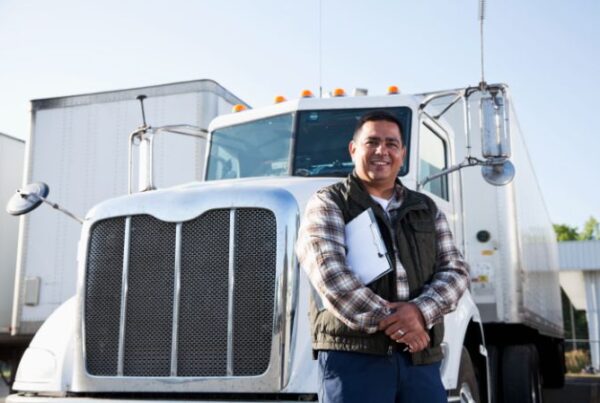 Truck drivers who are owner-operators are responsible for paying their taxes. This means you need to keep accurate
Truck drivers who are owner-operators are responsible for paying their taxes. This means you need to keep accurate records of your deductions as well as your earnings. If you don’t deduct all your expenses, you could end up paying significantly more taxes than you need to.
As you are reading through this article, keep in mind that Riviera Finance is not an accounting firm. We are sharing some tips we have learned working with transportation, freight and trucking businesses. Be sure to contact a licensed accountant for specific accounting questions.
Let’s look at some important and often overlooked tax deductions that owner-operators for trucking businesses can claim.
Top Tax Deductions for Trucking Businesses
1. Per Diem Deduction
The Per Diem deduction is one of the largest tax deductions applicable to truck drivers and trucking businesses. This allows you to deduct meals and other incidental daily expenses. The daily rate changes over time. The Per Diem rate, effective October 1, 2024, is $80 per full day and $60 per partial day in the Continental United States. Keep in mind that you’re only permitted to take this deduction while traveling a distance that requires you to sleep or rest away from home.
Federal and state tax laws are constantly changing, which makes it important to monitor recent developments. To get accurate per diem rates for every fiscal year based on state, visit the General Services Administration website.
2. Fuel and Other Travel Expenses
The fuel you purchase while driving, including taxes on fuel, is deductible. You can also deduct other travel-related expenses such as tolls and parking charges that are paid while you are driving for work.
Related: What to Look For When Choosing a Fuel Card
3. Business Supplies
As an owner-operator, you need to buy a variety of supplies. Many of these can be deducted. There is a limit of $500 per item. In addition to the cost of buying tools and supplies, you can deduct costs for repairing them. This might include items such as tarps, chains, ice scrapers, wide-load flags, and fire extinguishers.
4. Maintenance and Repairs
Costs associated with repairing and maintaining your truck or other fleet vehicles are another important type of deduction. This is a broad category that includes anything done to maintain, improve, or change equipment for another use. This includes tools you use to repair your vehicle, tires, oil, parts, and labor paid for services.
Related: 10 Ways to Increase Profitability of Your Trucking Business
5. Insurance
As an owner-operator, you may be paying for several types of insurance. Business-related insurance expenses are deductible. This includes liability, property damage, cargo, and policies that cover lost income due to interruptions. Health insurance can be deducted on Schedule 1 Form 1040 but not as a business expense.
6. Office Supplies
One type of deduction that’s easy to overlook are items not directly related to driving but that you need for your business. This includes office supplies such as paper, pens, notebooks, staplers, and envelopes.
7. Personal Items and Services
This is a general category that includes many products you buy that are necessary for your business. This includes uniforms, boots, motels, and showers. Keep in mind that you can only include items that are essential for operating your business.
8. Communication and Technology
You can deduct devices that are necessary for your business, which may include your cell phone, CB radio, ELD, internet, and radio. For some items, such as phone and internet service, you can only claim the costs associated with your business.
9. Non-Deductible Expenses
Items that you are not allowed to deduct are anything not directly connected to your business. This might include commuting, traveling for personal reasons, clothing you don’t need for work, personal cell phone and internet use, and any expenses that are reimbursed.
Related: Basic Accounting For Trucking Companies
Tips to Manage Your Finances
The above are general guidelines for identifying truck driver tax deductions. If you aren’t sure, you should always consult an accounting and tax professional. Managing your finances is essential for owner-operators, especially during times when many expenses are rising.
One way to improve cash flow for your business is to factor your freight bills or invoices. Factoring allows you to collect payment on freight bills immediately rather than waiting for clients to pay in 60-90 days. Riviera Finance is a leading provider of transportation factoring and provides customized services for owner-operators. Get a free quote from one of the nation’s top invoice factoring companies, contact Riviera Finance online today and someone from our financial specialist team will get back to you the same business day.
*This blog was originally published November 2022 and was updated in October 2024
As you are reading through this article, keep in mind that Riviera Finance is not an accounting firm. The information is provided by ATBS, an accounting and tax firm that specializes in the trucking industry. If you’d like more tax & accounting information and advice, please reach out to ATBS. If you mention you learned about them from Riviera Finance you will get a discounted rate.
Riviera Finance Fuel Card
Fuel discounts / 1,800 locations nationwide / Convenience
Fuel Discounts – Substantial savings at TA and Petro, Speedway, Roady’s & many other locations nationwide
100% Transparency – No account set-up fees or monthly maintenance fees, and low transaction fees
Mobile App / Online Resources – 24/7 Access to Fuel Finder Tool and Online Resources
Universally Accepted – Accepted nationwide at all major chains including Pilot, Flying J & Love’s




